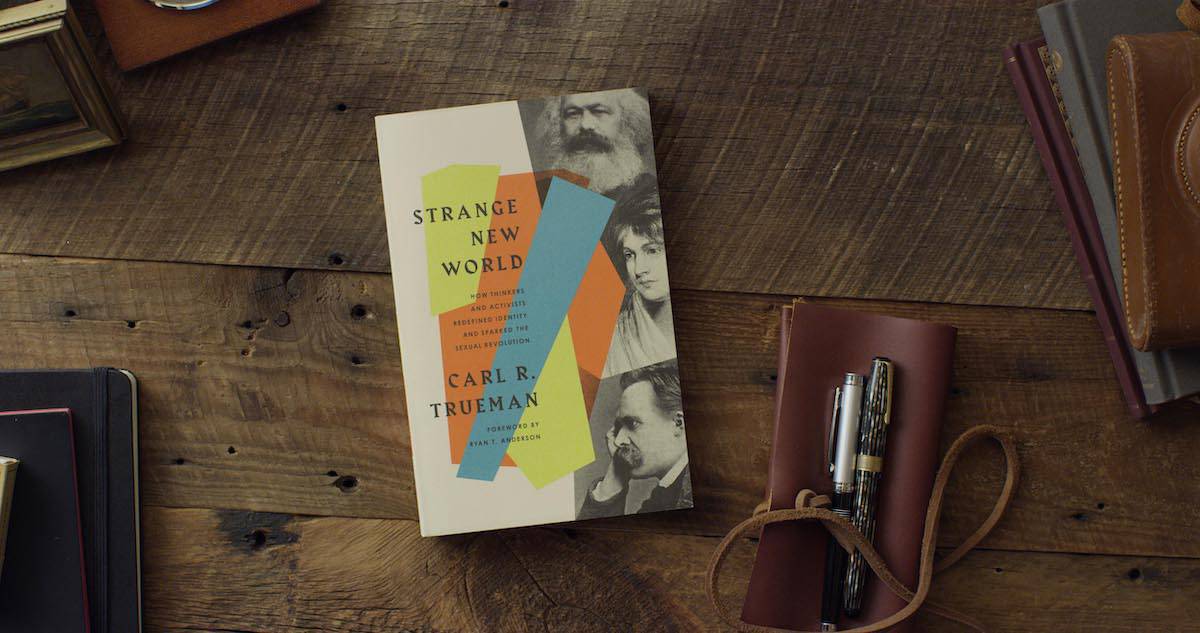Whatever else is true of the modern, Western world, this much is beyond dispute: It is not what it used to be. We have entered into a new world that is very different from the one that came before, a new world that in many ways feels so very strange. Many of us feel like immigrants who have inadvertently found ourselves in a new world and are learning to adapt to its new rules, its new norms, its new mores. Many of us are struggling to do so.
Carl Trueman has made a deep study of the origins of these changes and has shared his findings in Strange New World: How Thinkers and Activists Redefined Identity and Sparked the Sexual Revolution. “For many people, the Western world in which we now live has a profoundly confusing, and often disturbing, quality to it,” he says. “Things once regarded as obvious and unassailable virtues have in recent years been subject to vigorous criticism and even in some cases come to be seen by many as more akin to vices. Indeed, it can seem as if things that almost everybody believed as unquestioned orthodoxy the day before yesterday—that marriage is to be between one man and one woman, for example—are now regarded as heresies advocated only by the dangerous, lunatic fringe.”
If the problems were only “out there” it would be bad enough, but many are finding the problems are also impacting work, church, family, and every other part of life. “Welcome to this strange new world,” says Trueman. “You may not like it. But it is where you live, and therefore it is important that you try to understand it.” And that is what his book is all about—trying to understand the world as it is by understanding how it came to be this way.
To that end, Trueman considers the thinkers and leaders who led the way from the former world into the current one. Before he can do that, though, he must introduce some key concepts such as self, a term that has taken on new and inordinate meaning in the past few decades so that “the modern self assumes the authority of inner feelings and sees authenticity as defined by the ability to give social expression to the same. The modern self also assumes that society at large will recognize and affirm this behavior.”
This understanding of self is defined by what is called expressive individualism, a term meant to describe the notion that “each person has a unique core of feeling and intuition that should unfold or be expressed if individuality is to be realized.” This leads to a world in which authenticity is achieved when a person’s inward feelings are fully acted out publicly while receiving the unanimous praise and affirmation of society. This is seen in many ways, but particularly in the area of sexuality where a person’s identity is most fully defined by sexual desires and most fully considered authentic when they are acted out with the full affirmation of the public.
How did society get here? To answer that question, Trueman looks to thinkers such as Decartes and Rousseau who began to ground identity in the inner life rather than in external factors such as family, faith, or culture, and then to the Romantic poets who fostered this idea in popular ways. He looks to Marx and Nietzsche, to Freud and Reich, each of whom contributed ideas that are central to the Western mind’s self-understanding. He looks to the sexual revolution and to changing notions of personhood. He looks at the rise and dominance of the LGBTQ movement and, in its wake, the rise of transgenderism as perhaps the most complete and significant evidence of the seismic changes that have swept through society.
Many who consider this book will want to know how it differs from Trueman’s previous work The Rise and Triumph of the Modern Self which was released less than two years ago. He answers the question in the preface where he says that “this short book is not a precise précis [summary or abridgement] of my larger work … [it] covers the same ground in a briefer and (hopefully) more accessible format.” The arguments are essentially the same, but the information significantly reduced. Strange New World also addresses some of the constructive critiques of the first work, including its relatively brief handling of the “now what?” factor, while also addressing some of the changes that have taken place even in just the past couple of years. Speaking personally, I studied The Rise and Triumph of the Modern Self very closely and took thousands of words of notes. Yet I still benefited from Strange New World and am glad I read it. In that sense, I’d recommend it to those who have read the first work as well as those who have not.
As I have traveled the world, I have often hired tour guides to lead me through unfamiliar locations. Their expertise has always proven helpful in explaining what I am seeing and experiencing. And in much the same way, Strange New World is essentially a guided tour to modern times. Trueman acts as a wise and trusted guide to a culture that has become increasingly uncomfortable and unfamiliar. I highly recommend you take the tour.










